Top 10 ReturnGO Alternatives & Competitors to Retain Revenue

Do you want to handle your returns better, but think that ReturnGO isn't the tool to do that? Good thing you clicked on this article.
We analyzed (and tested) more than 20 ReturnGO alternatives and came up with the ten best ones you should check. These return management platforms offer solutions like better carrier coverage, more affordable pricing, or easier setup that will help you create a more efficient returns system.
Let's get started.
5 Factors to Consider in a ReturnGo Alternative
When choosing a ReturnGo alternative, you have to check these five things: its costs and your budget, what core features it has, how well it integrates, whether it can grow with you, and if the support team is reliable.
Let's help you evaluate each factor so you can find the best alternative faster.
1. Pricing and Cost-Efficiency
The first thing you have to do is determine your budget range for a returns management platform. From there, you can select the most cost-effective option that meets your needs.
Besides the price itself, you should also check the following:
- Volume-based tiered or flexible pricing: Do you want to pay a fixed amount for certain return limits, or would you rather pay only for what you actually use?
- Free trial vs free plan: Trials let you test everything temporarily. Free plans let you access limited features forever.
- Transparent pricing: Make sure that the alternatives you choose doesn't have any hidden charges.
2. Core Features and Capabilities
Another thing you should ask is this: Does it have the features I need to make my return process more efficient?
We suggest you create a checklist of current issues you have and see which tools can solve them. Besides analytics, here are some other features you have to look for:
- Exchange and refund options: Go for a tool that gives your customers more options, like online exchanges, in-store returns, and store credit.
- Return automation: Choose a platform that can easily automate return tracking updates, shipping labels creation, auto-workflows, and customer notifications for your brand.
- Logistics carrier support: Does it work with major carriers like USPS, DHL, FedEx, AliExpress, etc? And does it also support local ones?
3. Easy Integration
The returns platform alternatives should also seamlessly integrate with your existing tech stack. Or maybe some tools you want to use in the future.
Of course, we're not telling you to pick one that gives ALL possible connections. But at least a software that can connect you with the usual tools like:
- Ecommerce platforms (Shopify, WooCommerce, Magento)
- Customer service tools (Zendesk, Gorgias, Hubspot)
- Popular Shopify apps (Klaviyo, Zapier, Judge.me)
4. Scalability
The platform should allow you to process higher return volumes without taking half of the sales you made.
But being "scalable" also means adapting to your changing business needs. So, it's best to look for platforms that:
- Let you add new carriers or upgrade features as your business expands
- Allow you to move between pricing tiers anytime and on your own
- Work for small and medium businesses and even large enterprises to offer customized plans.
5. Reliable and Accessible Customer Support
How fast can the app’s support team respond when you have issues? Here’s what you need to look for:
- 24/7 assistance and omnichannel availability
- Fast response times
- Clear documentation and resources
Nice! Now that you know what to look for in a platform, let's explore the best ReturnGo alternatives next.
Top 10 Loop ReturnGO Alternatives and Competitors
ReturnGO is a decent returns management platform, but it's not for everyone. You might be looking for a more affordable solution, advanced fraud protection features, or… a better carrier integration.
So here are the 10 ReturnGO alternatives you can try instead:
#1 ParcelWILL (formerly ParcelPanel) Returns & Exchanges
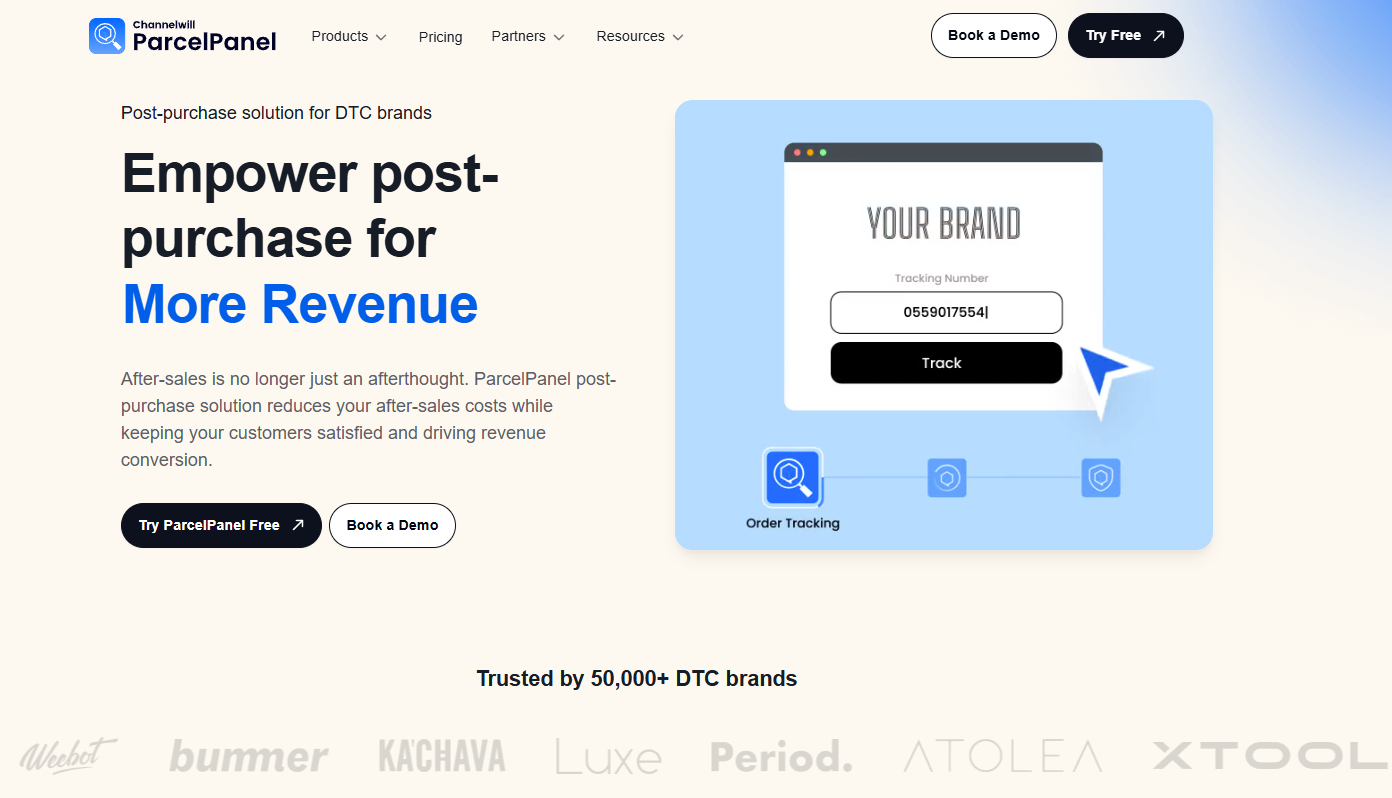
ParcelWILL Returns & Exchanges is the best return management platform alternative for Shopify sellers. It offers more flexible pricing and a user-friendly dashboard for your team.
This platform addresses return challenges like sales loss from refunds, high support volume (from return queries), and the lack of self-service options. It handles these issues with flexible exchange options, automated return notifications, and a branded self-service portal for your customers.
For example, one ParcelWILL client, Liv Fishing, used the platform to reduce return-related support requests by 43% and they were able to improve customer experience.
Carriers: 17+
Key Features:
- Integrated Carrier Network: Choose from 17+ deeply integrated carriers, including USPS, UPS, DHL, and FedEx, with discounted shipping rates (that help you cut return costs).
- Flexible Exchanges: Give your customers options to exchange their failed purchase for different items, sizes, or colors instead of getting refunds. This way, your sales won't disappear completely. Some may even be happy with options, and can help with customer loyalty.
- Branded Self-Serve Return Portal: Your customers can start their returns and exchanges through this customizable portal that collects return reasons and guides them toward exchanges instead of refunds.
- Intuitive Return Management Dashboard: Handle all your returns and exchanges from one central place with real-time updates that sync directly to your Shopify admin. You won't have to open multiple tabs to process returns.
- Return Protection: Consumers can choose to purchase the return protection at checkout or on the shopping cart page. So, if you have to process returns later, you can use that revenue to cover return shipping costs.
- Automated Email Notifications: Keep your customers updated on their return status automatically so they know what's happening with their items. You can also set up alerts for your team when issues need attention before they become complaints.
Pros
✅ It offers a quick (and easy) dashboard setup for users
✅ ISO 27001 certified, so your system is safe from online attacks (or cyber threats)
✅ It supports 16 languages, including English, French, German, Italian, Dutch, Spanish, and Chinese (Simplified), so you can serve international customers
✅ Flexible return methods
✅ Works well with Parcel Panel’s order tracking and shipping protection for a complete post-purchase experience
✅ Great value for money as it offers a free plan and a base plan of $20/month
Cons
❌ API, webhooks, and advanced automation are only available on the higher plans
❌ The free plan is limited to only six credits per month
Best for: ParcelWILL Returns & Exchanges is a great tool for Shopify SMB sellers who manage 60 to 1,500 returns a month.
Integrated with: Shopify and Shopify Plus
Pricing: ParcelWILL Returns & Exchanges paid plans start at $20/month for 20 orders (credit-based). You could try it for seven days for free.
#2 Shipup Returns Management
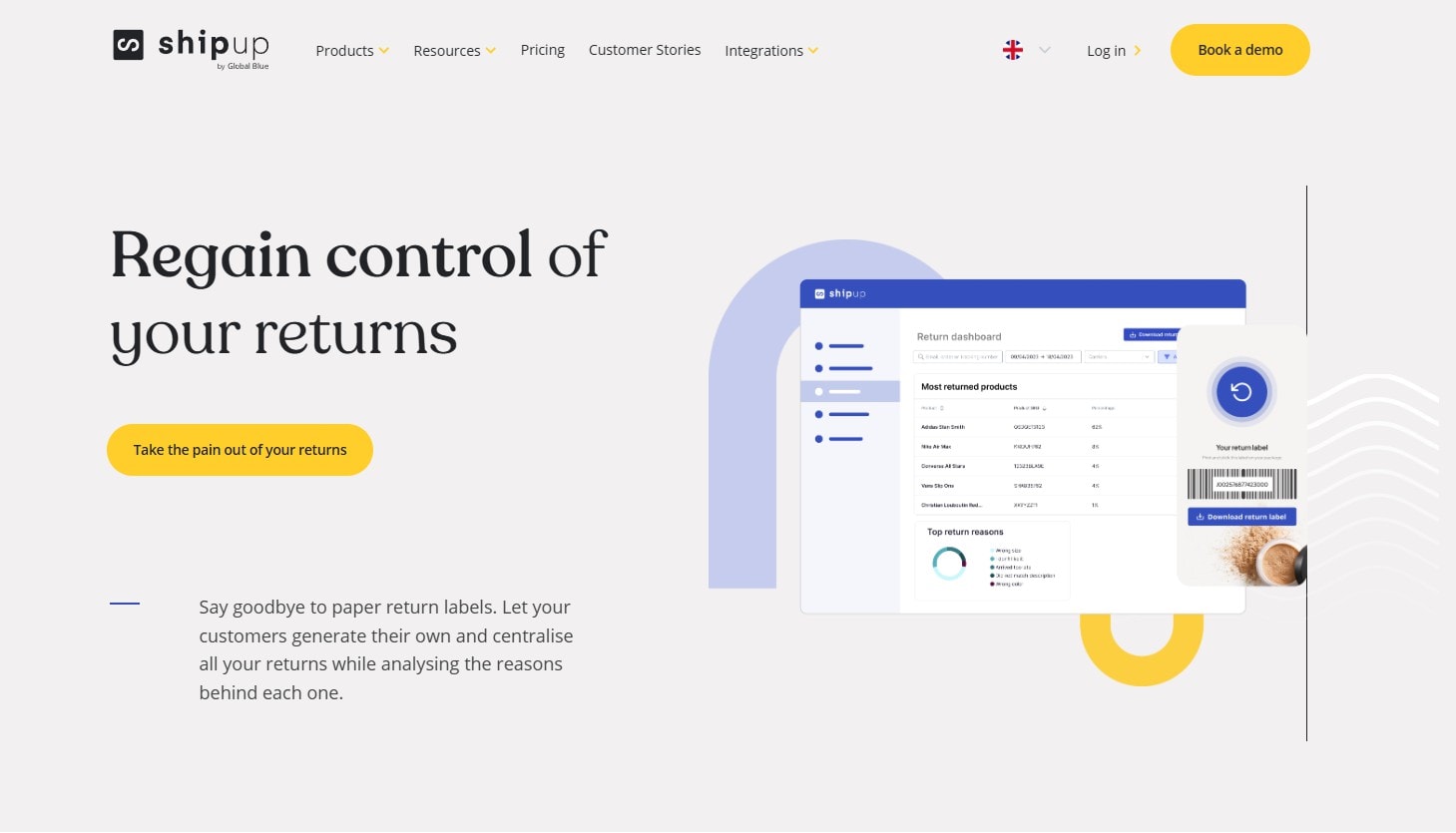
Shipup Returns Management is part of the platform's post-purchase suite that lets customers handle their own returns through a digital portal. You also get detailed analytics on return patterns and customer behavior.
Carriers: 150
Key Features:
- Self-Service Portal with Digital Labels: Your customers can start returns from your website and create their return labels.
- Centralized Dashboard with Analytics: Shipup lets you monitor all returns in one place and see which products get returned most often.
- Automated Exchange and Store Credit Options: It provides your customers with choices between refunds, exchanges, or store credits.
Pros
✅ Has a user-friendly and aesthetic interface
✅ Offer flexible returns by allowing customers to choose shipping method and drop-off location
✅ It provides more advanced analytics and reporting
Cons
❌ You can't get the returns management feature separately from the other tools
❌ It's more expensive than ReturnGO and some other competitors
Best for: Online retailers and ecommerce merchants who need a scalable but plug-and-play solution.
Integrated with: Major ecommerce platforms, Salesforce Commerce, Zendesk, Gorgias, Chrome
Pricing: Shipup offers a mix of pay-as-you-go and tier-based pricing. But you have to get the Advanced plan (around $680/month) to get Shipup's return management feature.
#3 Loop Returns
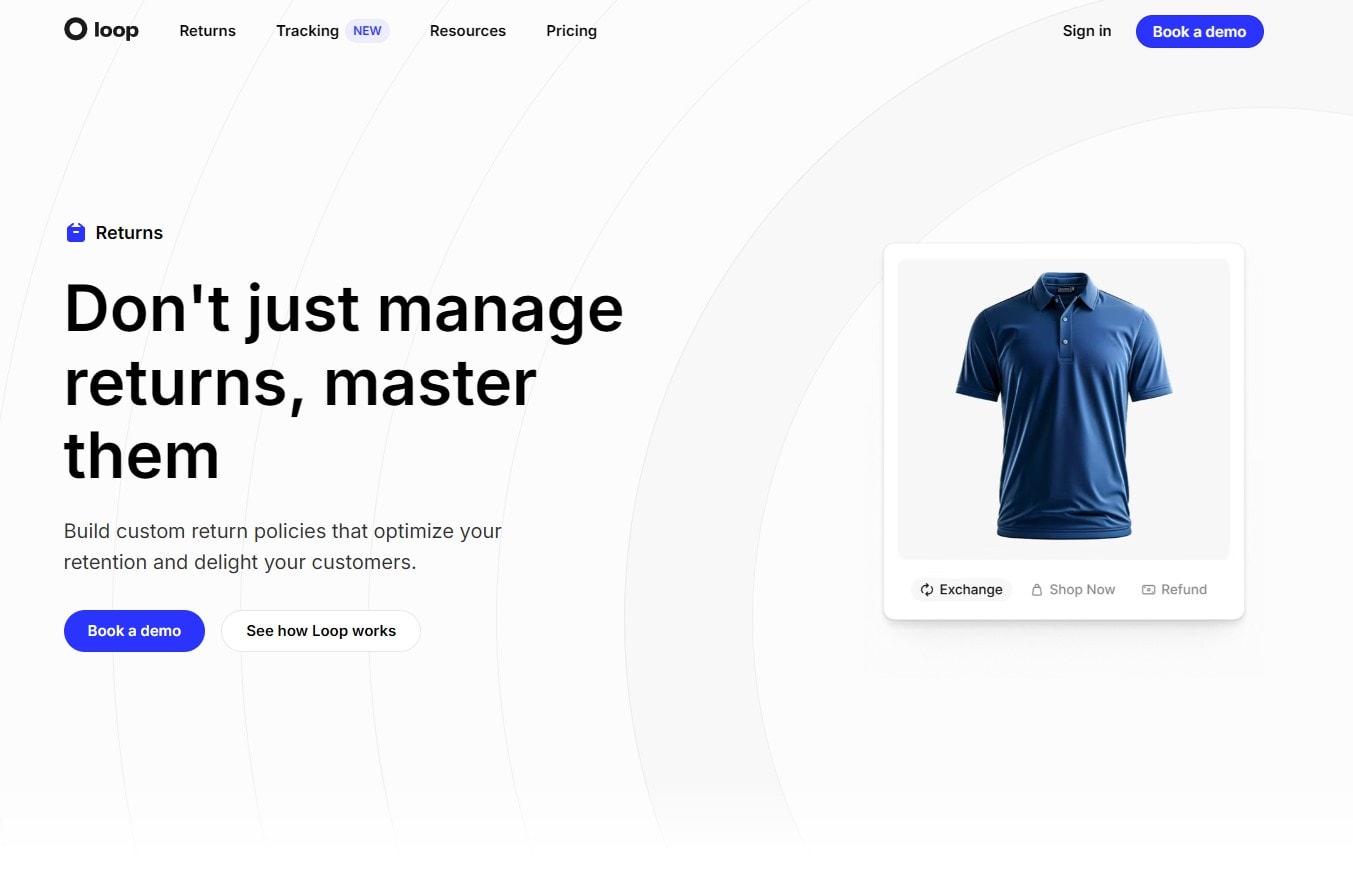
Next: Loop Returns. This non-traditional returns solution allows you to turn potential refunds into revenue opportunities with advanced exchange options and customer incentives.
It offers tools that keep customers with you even after they request a return. You get multiple ways to win them back (and earn more revenue)!
Carriers: 21
Key Features:
- Advanced Exchange Options: Let your customers swap their items for anything in your catalog, not just different sizes or colors.
- Instant Exchanges: Send out replacement items before customers even ship back their returns. You hold their payment info as security, so there's no risk on your end.
- Custom Return Policy Automation: You can set up different rules for different customers, and you can automate this with complex workflows.
Pros
✅ You can integrate it with 120+ Shopify apps
✅ It offers advanced security solutions like 2FA and SSO for enterprise-level protection
✅ Provides fraud prevention tools to protect your business from return abuse
Cons
❌ Some of the great features, like fraud prevention, bonus credit, and instant exchange, are only available on higher plans.
❌ Carrier integration isn't as great as other ReturnGO competitors like ParcelWILL
Best for: Shopify brands, merchants, and brick-and-mortar stores in the UK and Australia.
Integrated with: Klaviyo, Zendesk, Gorgias, Stripe, ShipBob, ShipHero, and Stord
Pricing: Loop offers a simple tiered pricing plan for its users, and it starts at $155/month.
See more Loop Returns alternatives.
#4 Return Prime
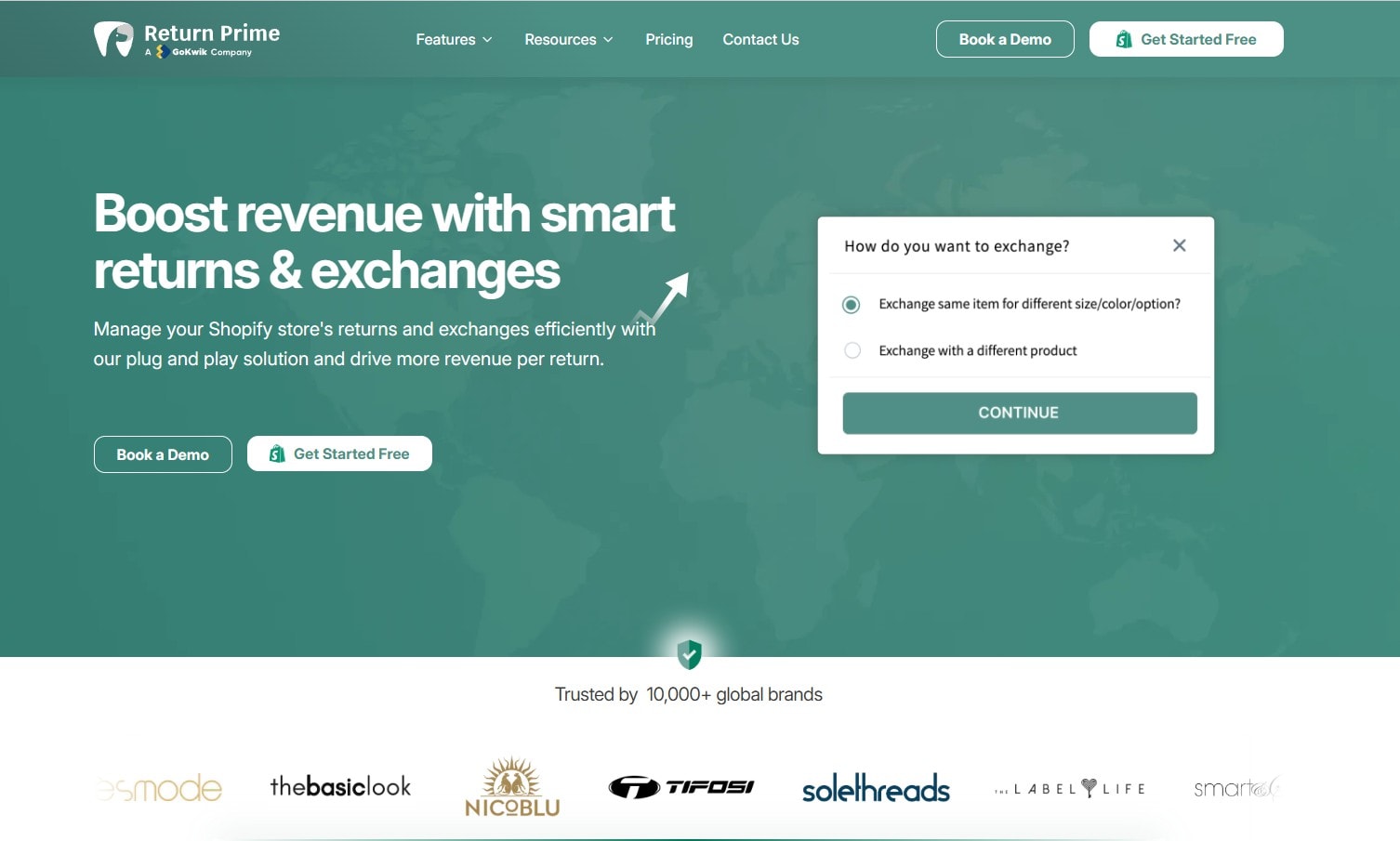
Return Prime is another automated returns management system that helps you make money from returns. The platform suggests relevant upsells and store credit options to your customers during the return process. And that helps them buy something else inside your store instead of going for a refund.
Carriers: 11
Key Features:
- Return Automation: You can auto-approve returns and exchanges using custom rules for different scenarios, like defective products or size exchanges.
- Upselling During Returns: It allows you to set up rules to show specific items based on their return or purchase history.
- Exchange Incentives: Offer targeted discounts to encourage exchanges over refunds. You can set percentage or fixed discounts to increase your average order value.
Pros
✅ It works and syncs well with the Shopify store.
✅ You can get started at an affordable price.
✅ It offers a built-in ROI calculator so you can see how much you're earning from upselling.
Cons
❌ Integrations aren't the best in the market
❌ It can be a bit difficult to find discounted return shipping because of limited carrier partnerships
Best for: Shopify store owners who want to make their return platforms a revenue generator.
Integrated with: Shopify, Zapier, Yotpo, Klaviyo, Richpanel
Pricing: Return Prime offers custom pricing and a pay-as-you-grow plan that starts at $19.99 for 60 returns/month. It also offers a 14-day free trial.
#5 AfterShip Returns Center
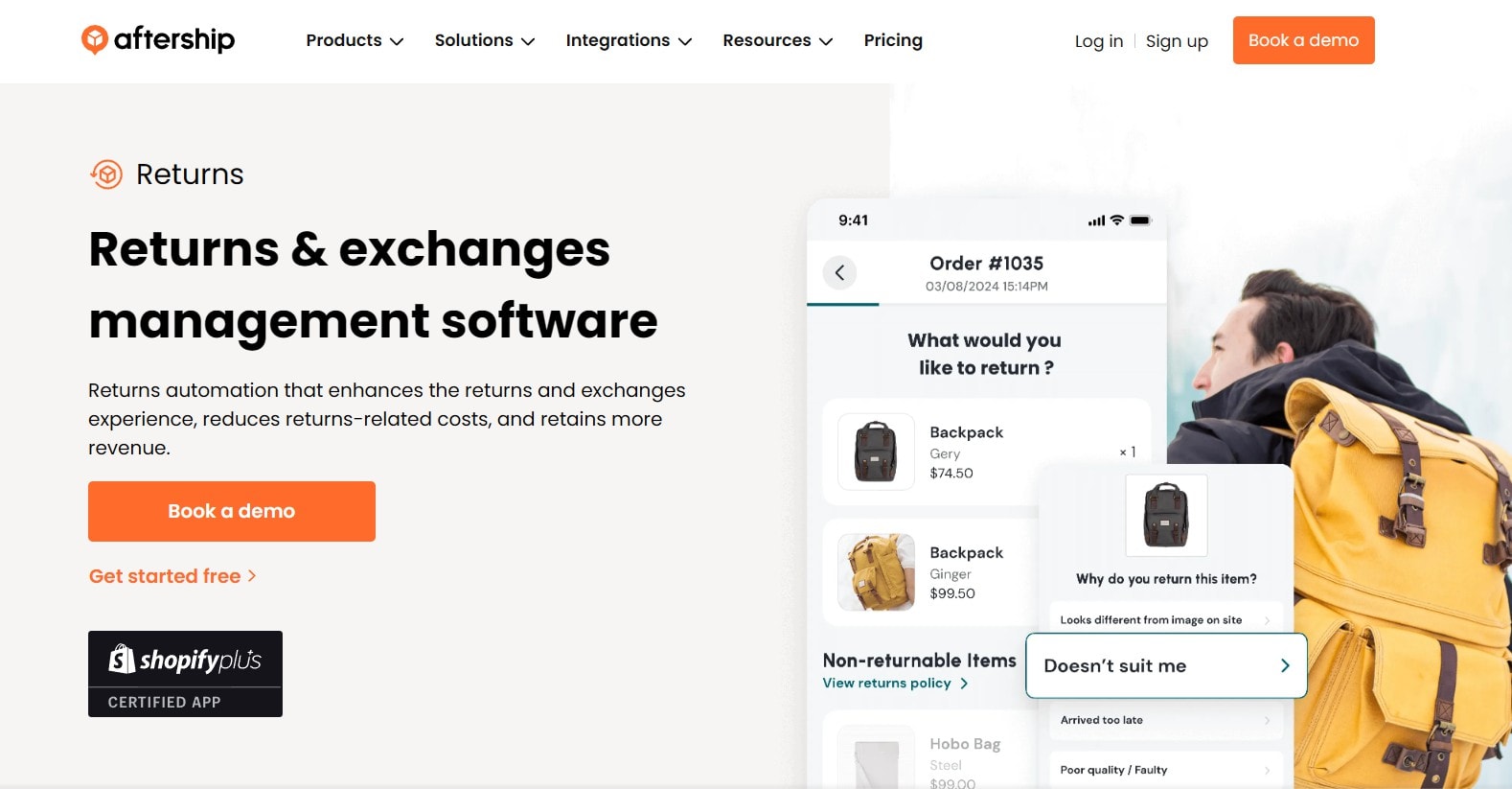
Now, for our halfway point of return alternatives: AfterShip Returns. With this tool, you can automate complex return policies and give your customers access to over 300,000 drop-off locations worldwide.
Carriers: 44
Key Features
- Flexible Refunds & Exchanges: Offer your customers multiple return options, including instant exchanges and store credits
- Return Fraud Management: Automate fraud detection and prevent suspicious returns by tracking customer return patterns and weight discrepancies.
- Partial Returns for Bundles: Your customers can return individual items and keep the rest with this feature.
Pros
✅ It supports omnichannel returns, and your customers can exchange items online or in-store
✅ AfterShip has a Return API feature that's perfect for custom integrations and advanced workflows
✅ You can buy just the returns feature à la carte
Cons
❌ It has put a limit on the carrier you can connect with your plan ( the Essential plan only allows you one carrier connection).
❌ You have to pay 20-30% more of your subscription fee for better customer support.
Best for: Mid-to-large ecommerce businesses that want easy cross-border returns.
Integrated with: Major ecommerce platforms, Klaviyo, Attentive, Gorgias, and Yotpo
Pricing: AfterShip also has tier-based pricing (like most of the alternatives). Its paid plans start at $11/month for 20 orders. But you can start with a 7-day free trial.
See more AfterShip alternatives.
#6 Narvar Return and Exchange

Narvar Return and Exchange is an AI-powered returns platform that catches fake returns before they happen. It protects your sales and also makes it easy for genuine customers to swap items or get store credits.
Carriers: 1000+
Key Features
- IRIS™ AI Fraud Detection: It analyzes customer behavior and purchase patterns for you to detect any fraudulent claims (so you can avoid them).
- Reverse Logistics Optimization: Allows you to lessen returns costs by routing your items to the most cost-effective paths and shipment partners.
- Revenue Retention: You can encourage customers to choose exchanges or store credit over refunds with automated offers.
Pros
✅ The updated customer interface is more user-friendly
✅ It offers advanced fraud protection with the use of artificial intelligence
✅ You get Narvar's returns management feature along with other post-purchase tools
Cons
❌ Non-transparent pricing (but based on a review and our research, it's quite expensive).
❌ Narvar only offers a few integrations with ecommerce and other marketing platforms
Best for: Large ecommerce businesses that need extra protection with their returns operations.
Integrated with: Zendesk, Klaviyo, Salesforce, SAP Hybrids, BigCommerce
Pricing: It offers custom pricing, and you have to request a demo to get an idea of how much to pay.
#7 Happy Returns

Happy Returns is a UPS-owned returns platform and Shopify Plus Certified App that gives customers access to 8000+ physical drop-off locations nationwide.
Your customers can skip the stressful packaging and shipping process that returns often require.
Carriers: 17 (but some integrations need activation with Happy Returns customer support).
Key Features:
- BORIS (Buy Online, Return In-Store): It allows your customers to return online purchases at your physical store to give them more return options.
- Omnichannel Returns Processing: You can handle returns either online or in-store. It gives your customers a choice to pick which is more convenient.
- One-Click Exchanges: Your customers can swap items for different products in just one snap (instead of doing separate returns and purchases).
Pros
✅ Flexible return options
✅ Secures your business from return fraud by asking for verification in the drop-off locations
✅ It allows you to provide incentives for new purchases during the return process
Cons
❌ It doesn't offer public pricing
❌ The carrier integration is super limited
Best for: Shopify stores, online merchants, and physical stores that want to offer omnichannel returns.
Integrated with: Shopify, BigCommerce, Loop, Klaviyo
Pricing: You'll have to contact their team for the exact pricing. But Capterra mentioned it charges a $500 flat rate per month.
#8 Redo Returns
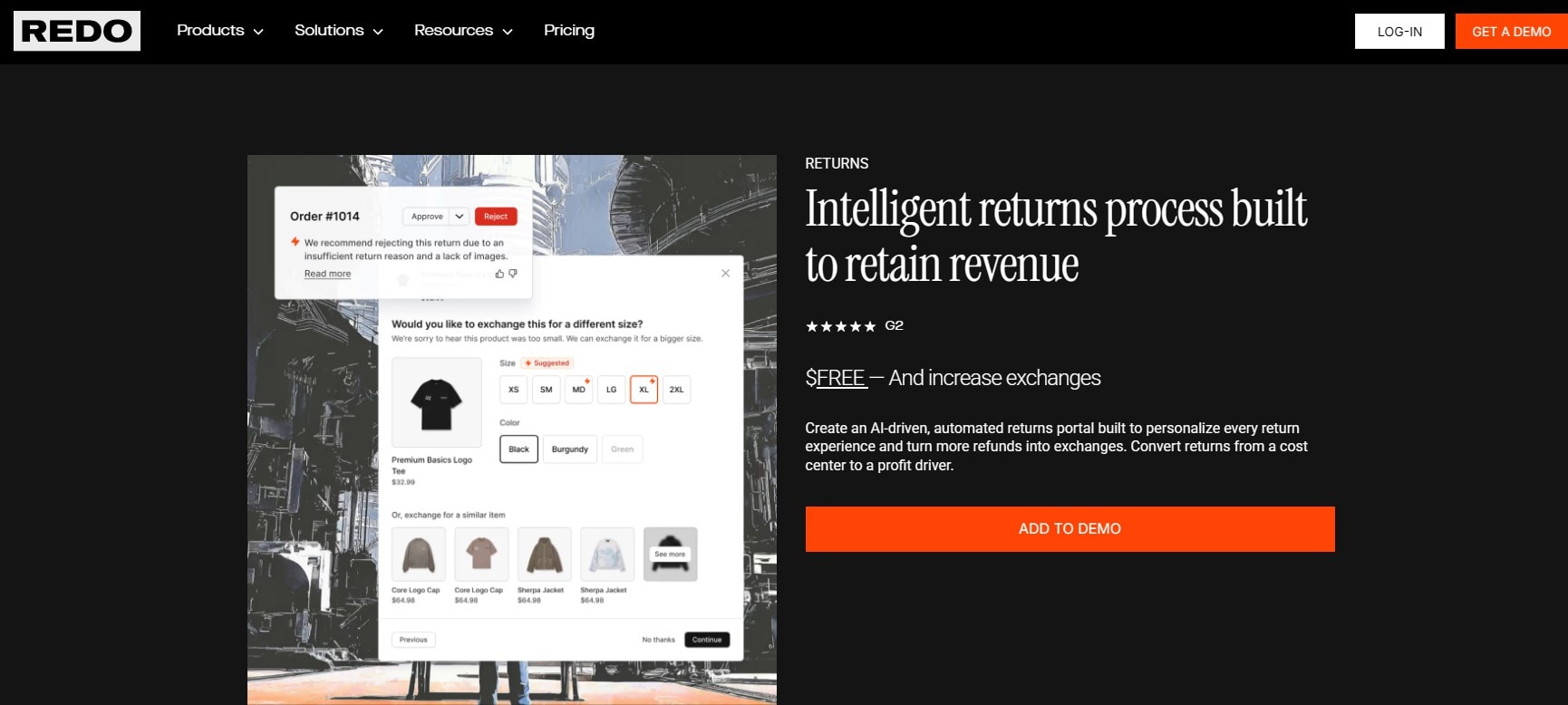
Redo Returns is another ReturnGO alternative that uses AI to suggest better exchange options when customers want to return items.
What we're completely surprised with is that the platform is free to use, and they even pay for your return shipping labels.
Carriers: Six
Key Features
- AI Exchange Recommendations: It can analyze your customers' behavior and return reasons to suggest better replacement products for them.
- Automated Return Review: Its AI feature can help you review return images and customer history to approve or reject returns based on your policies.
- Product-Level Return Analytics: Shows you which products get returned most often with detailed reasons.
Pros
✅ The platform is free to use (you can check the Pricing page to confirm)
✅ It allows you to evaluate returns and claims in one dashboard
✅ Redo also offers fraud prevention tools
Cons
❌ The customer support can be improved
❌ It doesn't offer much carrier integration
Best for: Small to medium-sized Shopify merchants who want to save some money on free software and reduce their return costs.
Integrated with: Shopify, BigCommerce, Salesforce, Klaviyo, Google, and Gorgias
Pricing: The software is free, but you'll have to request a demo with their team to proceed.
See more Redo alternatives.
#9 Corso Returns and Exchanges
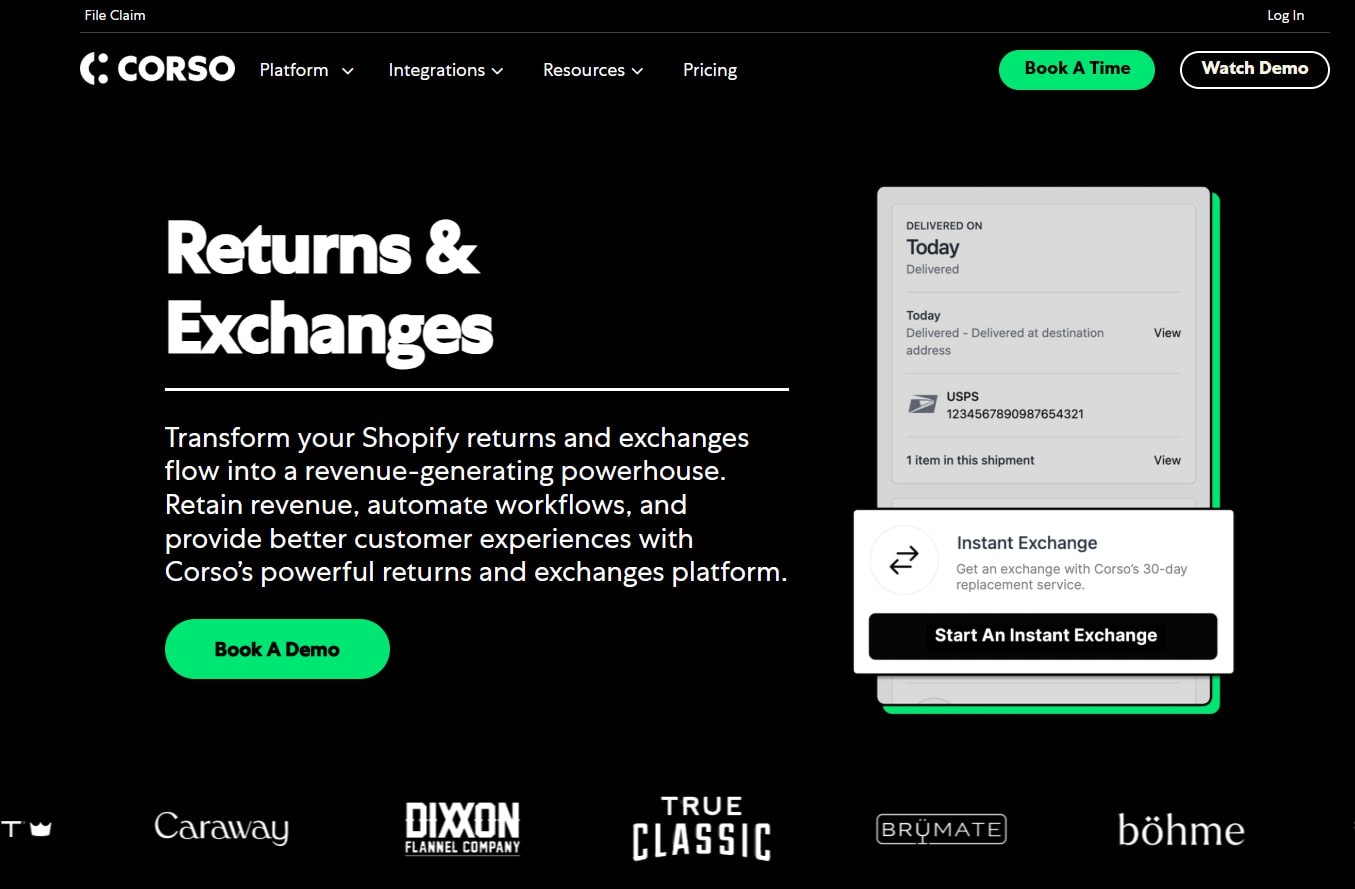
Corso Returns and Exchanges allows you to save some costs by letting your customers pay for premium replacement services. It might not be the best approach for every brand, but they mentioned it works for some.
Carriers: One (shipping partner)
Key Features:
- Advanced Exchange Groups: It lets your customers exchange items across different product variants or completely different product categories (instead of the usual size swaps).
- Flexible Return Policy Automation: You can set up custom rules that handle exchanges, store credits, and refunds based on your pre-specified conditions.
- Dynamic Fee Structure: Apply handling fees to refunds automatically or create rules that charge fees based on return reason or customer history.
Pros
✅ You can avoid return costs as your customers will cover the fee for that.
✅ The platform offers a complete post-purchase experience (the returns feature is part of that)
✅ You can get useful data to improve your refund system with AI
Cons
❌ It doesn't have enough carrier integration
❌ Non-transparent pricing
Best for: Mid-to-large Shopify brands that want to turn returns into profit centers and don't mind customers paying for premium service.
Integrated with: Shopify, BigCommerce, Gorgias, Sendlane, Klaviyo
Pricing: Corso offers custom pricing only. You'll need to provide your work email and connect with their sales team.
#10 ClickPost Shopify Returns Plus
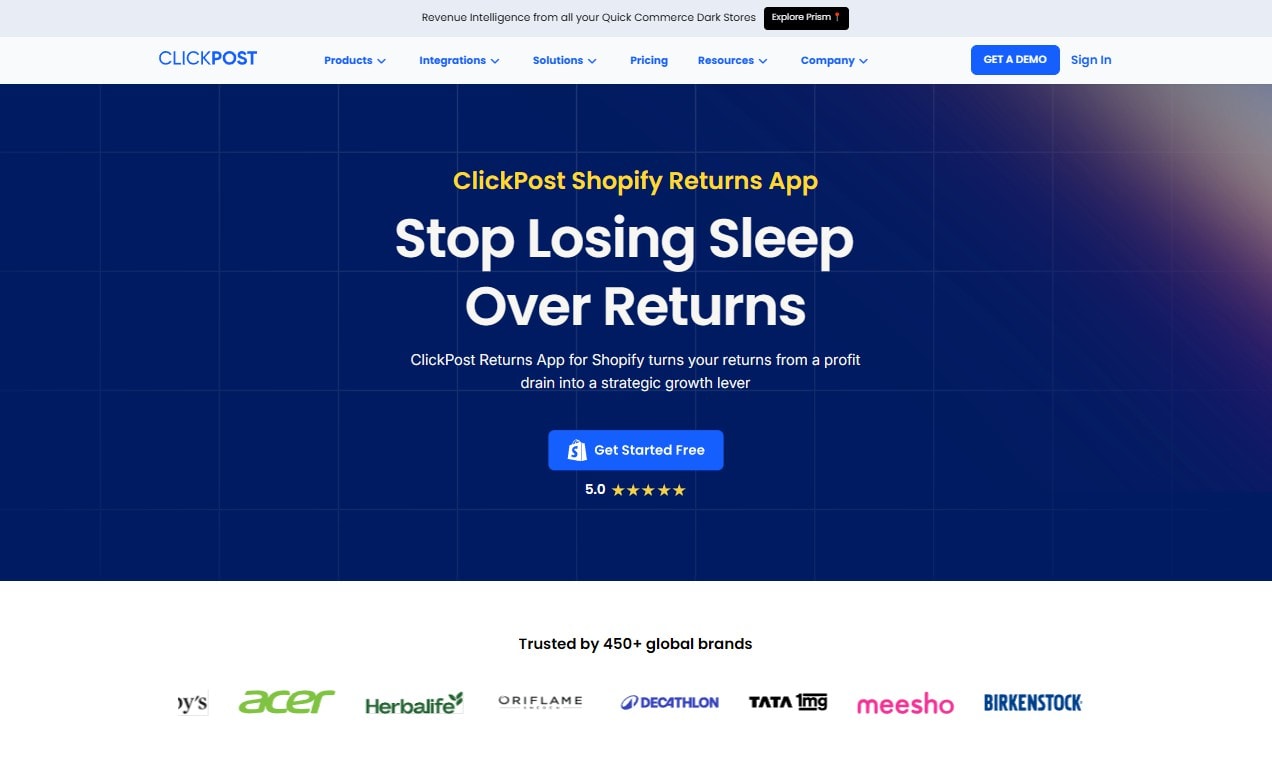
Time to wrap up our list with ClickPost Returns Plus. It's a Shopify-exclusive returns management platform that is like a lite version of ClickPost's main software. This app allows you to improve return process by setting up branded portals and letting customers handle their own returns (while you track data and monitor any issues).
Carriers: 500+
Key Features:
- Automated Approval Workflows: Set up rules that automatically approve or flag returns for manual review based on your criteria. Your team spends less time on routine approvals.
- Branded Self-Service Portal: Your customers can start and track their returns on their own.
- Revenue Retention Tools: It allows you to offer store credits instead of refunds and send automated return updates.
Pros
✅ The free plan covers up to 100 returns per month
✅ It offers strong security and protects your data with SOC 2, GDPR, and ISO 27001 certifications
✅ It connects with a good number of carriers
Cons
❌ It only supports one language
❌ Some benefits offered by ClickPost's main platform may not be available in the Shopify app
Best for: Small to medium Shopify stores that want to automate their return process with a more affordable tool.
Integrated with: Shopify
Pricing: It offers a tiered pricing plan. You can start with a free one, then pay $49/month for the Basic plan.
Great! We’re now done with the detailed list. You already know the best ReturnGO competitors. It’s time for us to help you choose which platform to try.
Choosing the Right ReturnGO Alternatives (with Decision Matrix)
Focus on these five things when picking a ReturnGO alternative: business size, team tech skills, their benefits, shipping complexity, and pricing flexibility.
Here are the top alternatives based on these criteria:
| Business Type | Recommended Solutions | Why Are They Good Options | Business Scale | Technical Capability | Logistics Complexity | Pricing Flexibility |
| Startups | ParcelWILL Returns & Exchanges, Redo Returns, Return Prime | Affordable, easy setup, low technical barrier, supports Shopify integration | Startup | Non-technical teams | Domestic (can expand) | Free trial, freemium, quota-based |
| Small Shopify stores | ParcelWILL Returns & Exchanges, ClickPost Returns Plus, Return Prime | Shopify-first tools, simple onboarding, self-service portals | Startup / Growing | Non-technical teams | Mostly domestic | Free tier, pay-as-you-grow |
| Mid-sized ecommerce | AfterShip Returns Center, ParcelWILL Returns & Exchanges | Broader carrier coverage, advanced dashboards, fraud control | Growing | Moderate technical knowledge | International returns | Tiered pricing |
| Growing DTC brands | Loop Returns, ParcelWILL Returns & Exchanges, AfterShip Returns Center | Advanced exchange incentives, upselling tools, scalable features | Growing | Teams with some technical expertise | Domestic + some international | Tiered or custom pricing |
| High-volume sellers | Narvar Return & Exchange, Shipup Returns Management, AfterShip Returns Center, ParcelWILL Returns & Exchanges | AI fraud detection, enterprise-grade tools, omnichannel options | Enterprise-ready | Tech-savvy teams or dedicated ops | Complex international logistics | Custom or premium plans |
| Global brands | Narvar Return & Exchange, Happy Returns, ParcelWILL Returns & Exchanges, AfterShip Returns Center | Omnichannel returns, global drop-off points, robust fraud prevention | Enterprise | Tech-savvy teams with IT resources | Extensive international coverage | Custom pricing |
Final Words
So those are the ten solid ReturnGO alternatives. Always remember that the right choice depends on your business type, goals, budget, and needs are.
If you're ready to experience a headache-free return process, start your 7-day free trial with ParcelWILL Returns & Exchanges.
ReturnGo Alternatives FAQs
What is the difference between Loop and ReturnGO?
The difference between Loop and ReturnGO is platform focus and flexibility. ReturnGO works with multiple platforms and offers more customization options. Loop focuses on Shopify stores with simpler setups and better exchange incentives to retain revenue.
Why are merchants looking to switch from ReturnGO?
Some merchants are switching from ReturnGO because they find it confusing to use, the customer support is slow to respond, and some have trouble with basic tasks like creating return labels. Others just need better pricing or more shipping options.
Are there free alternatives to ReturnGO?
Yes, Redo Returns and ClickPost Returns apps are some of the free alternatives. Plus, some platforms offer free trials like ParcelWILL and AfterShip.
What are the factors to consider when searching for the right alternative to ReturnGO?
When searching for the right alternative to ReturnGO, you have to consider pricing, features, integrations, scalability, and customer support quality.
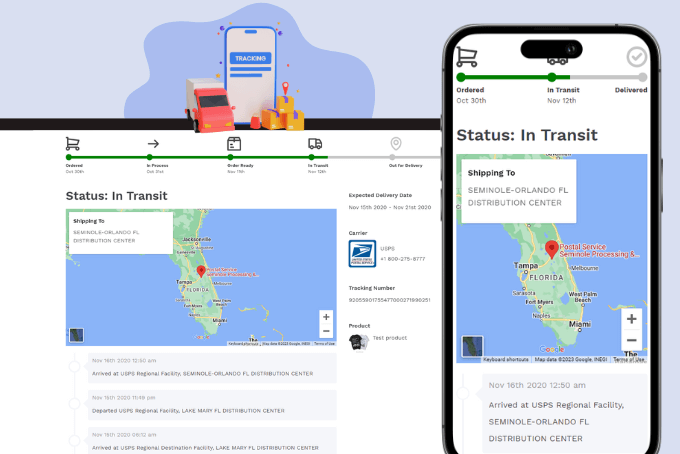


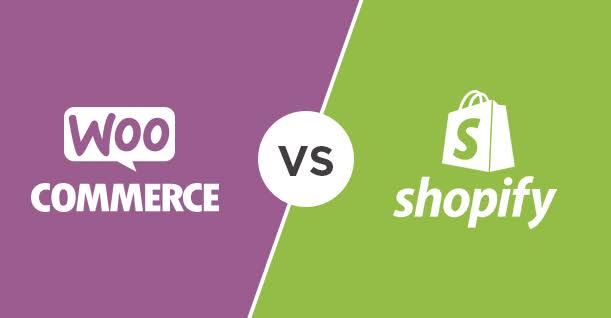

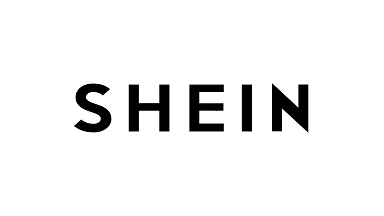




![Top 10 Route Alternatives & Competitors [2026]](https://blog.parcelpanel.com/wp-content/uploads/2025/11/Route-Altenatives.png)

![Top 10 parcelLab Alternatives & Competitors [2026]](https://blog.parcelpanel.com/wp-content/uploads/2025/11/AfterShip-Altenatives-9.png)













